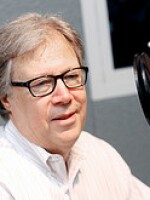The great – composer, champion of simple living, all-purpose contrarian – left us a few days ago.
Max, as he invited nearly everyone to call him, was one of the music world’s true originals. His music could be maddeningly difficult, but it could also partake of a craggy, unsentimental beauty, as was the case with the piece that has become his most popular here in the states, “Orkney Wedding with Sunrise.”
The “Orkney” refers to the remote Orkney Islands of Scotland, in whose vicinity Max lived the last 40 or so years of his life, mostly in a home without electricity or central heat. Among its other distinctions, “Orkney Wedding” is one of the truly tiny body of orchestral pieces that call for bagpipes.
I was fortunate to be granted an interview with Max back in the mid-'90s, while he was on an American tour.
Classical musicians and composers, I painfully learned in my Hartford Courant days, were not always good interviews. And in this case, we had been told to expect the worst: even his press person warned that he could be taciturn, uncooperative, potentially dismissive of the interviewer.
He was none of those things. In fact, he bordered on the garrulous, even breaking off a few one-liners.
As advertised, he was not shy about rendering opinions, even about his fellow living composers. Asked about the slow, tonally-based music being turned out by such figures as Arvo Part and Henryk Gorecki, which was currently fashionable and which in some circles had come to be called “holy minimalism,” Max chirpily said that he found listening to it “like staring into a vacant face.”
But the topic that animated him the most in our conversation was public funding for the arts. Both in the U.K. and in the United States, such funding had suddenly become even more imperiled than it had always been, and in our country there had been growing talk of eliminating the National Endowment for the Arts altogether.
Max’s words on de-funding the arts, are, to say the last, still timely:
It's a form of depriving people of their basic right of access to their own civilization. If you deprive people of their natural birthright of culture -- and America has a very great culture -- you deprive them of an important piece of their education, and thus you reduce their capacity to criticize the government. If you don't know anything, how can you criticize? With no access to your own roots, you are more or less doomed to be a pawn, manipulated by the big multinational corporations and the big banks, who want to turn everybody into a docile and obedient consumer. If you don't conform you are thrown on the scrap heap, where you fester and die.
The Maestro Teacher
A couple of weeks earlier, we lost the great conductor and teacher of conducting .
Mueller, who was 89, had a distinguished career on the podium in both Europe and the U.S. But he will probably be remembered most for having trained two generations of orchestral conductors.

He taught at Yale, Juilliard, and most recently, the Curtis Institute. Among his more celebrated students were Alan Gilbert, Jaja Ling, Paavo Jarvi and Edward Cumming, currently director of the orchestra program at The Hartt School, and before that music director of the Hartford Symphony.
I think a lot of people may have forgotten that Mueller himself was a candidate for the HSO music director position, back in the mid-'80s. He didn’t get the job, but he made a deep impression on both the musicians and the audience. Also the critic. My “interview” with him consisted primarily of his grilling me on everything from Beethoven’s sketchbooks to the fatal decline (as he saw it) of classical music instruction in public schools. And as I recall there was a flash quiz on musical terms. Thank heaven I knew what “attacca” meant.
Making the Old Sound New
Also departing this realm: . The Austrian conductor died at 86 earlier this month.
I haven’t always been that convinced by the “historically informed” performance movement, of which Harnoncourt was one of the leading practitioners. And yet, I have to say that I have reached for his set of the Beethoven Symphonies (Teldec, with the Chamber Orchestra of Europe) so often over the years that the once-sturdy cardboard box that houses it has almost fallen apart. The performances crackle with energy and passion.
Two Originals
: Rock critics freely talk about the virtuosos of the genre. But bending a few blue notes on a Stratocaster does not a virtuoso make. Emerson fit the title.
: Not much press attention for some reason, but the singer with the beguiling little catch in her voice passed last week at age 91. What can I tell you – I think “The Wayward Wind,” with its defiant Brucknerian French horn figure and frontier choir, was a great record. It had to have been: it knocked “Heartbreak Hotel” out of the number one Billboard chart position in 1956, and held onto it for six weeks.
Reach Steve Metcalf at spmetcalf55@gmail.com.


